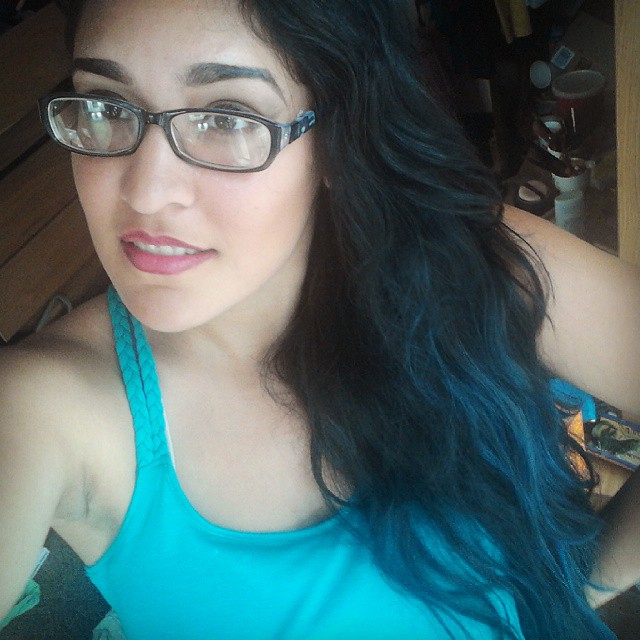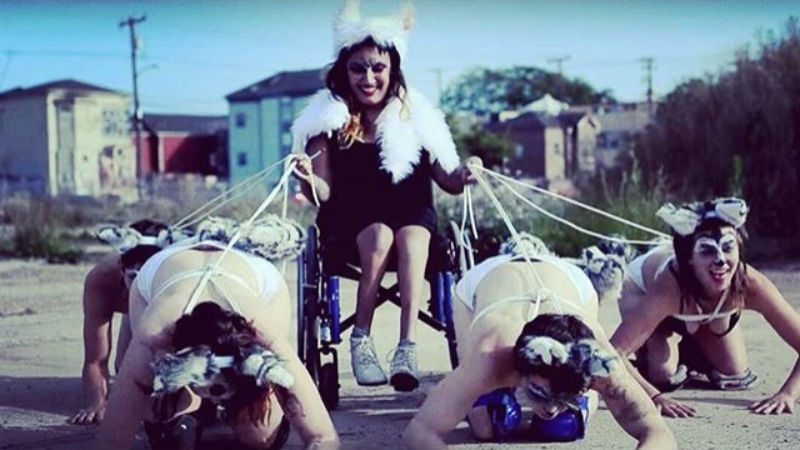A three-part series featuring queer disabled voices.
One reason why it is not enough to say that disabled people are sexual to a nondisabled audience is that some people will interpret our choice to not shy away from our disabilities in a sexual context as an open invitation to fetishize them sexually.
“I very briefly dated a person who straight up fetishized my disabled arm and it freaked me out. They were sexually turned on by the fact that I was often dependent on the kindness of others but still always tried to do things myself. Like, they would watch me try to do something they knew I ‘could’ do but is much more difficult for me as a disabled person, and be like ‘It’s so sexy how you’re trying so hard to open that wine bottle’.” – Jacqueline Mary
“Other times I am contacted (say on a dating site as an example) by people who have a thing for people with disabilities, people who want to “take care of me” and are very insecure with themselves and need someone to depend on them and think ‘Oh if I can keep her dependent on me, then she’ll never leave me,’ etc. Or, I’ve met people who like the attention they got as a result of being with me and helping me out. ‘What a person!’ as if they deserve extra kudos for dating someone in a wheelchair.” – Michele
It’s not that hard to check in with someone about what they’re into. If you wouldn’t assume that the able-bodied girl you’re crushing on is into being called “baby” and carted around in a pink stroller (not knocking it if you’re into it), then don’t assume that a disabled person wants to be infantilized, as a part of sexual faire, or ever at all.
Due to a host of reasons involving intersecting experiences of ableism, trauma, misogyny, homophobia, transphobia, etc., a lot of queer disabled people have complex relationships to sex. Despite my love of and fascination with sex, it remains a place of much thorniness and difficult feelings in my life. If you look and listen enough, you might find that less individual’s roads to sex are as direct than you would be led to believe. Maybe even your own is many veined.
Sexuality is about more than just having sex. Sexuality, in my opinion, and this is why I’m so in love with it as a topic, is the many splendoured thing, as much as love. It is a life force running through our bodies. Sexuality is sensuality and embodiedness and then some. What blocks us access to our sexuality is not our disabilities, but societal ableism. For societal ableism is what tells us that we are not embodied, or that our embodiment is not enough. Queer disabled people (and queer disabled people of color, etc) are told that multiple aspects of our identities make our embodiment and fulfillment unlikely.
One of the biggest things that hurts queer disabled people is isolation, both physically, in the form of isolation from one another’s bodies, and in the form of a lack of access to knowledge and resources about/for ourselves. Isolation is multifold, because often, even our intersecting identities are isolated from one another. Not all queer spaces are accessible or welcoming of disabled people, and not all disabled spaces are queer or queer friendly.

“Sometimes my disabled identity keeps me at a distance from the queer community. Because smoking is so pervasive in the queer community and tobacco triggers my asthma, sometimes I physically can’t be in queer spaces.” – Kira
“I am intersectional but a lot of times specific communities are not. The key is intersectionality.” – Michele
A lot of us find the most intersectional and accessible outlets and resources via social media. Consistently, it is the internet that has kept me grounded and connected to other disabled people when one or both of us can’t be where we want to be, or when where we want to be and need to be is bed.
“I spend more time in irl queer spaces that in disabled spaces, whereas my time online is in disabled qpoc spaces.” – Chiara
“I wish people would show up for me and other disabled people to have a better quality of life and to have access to company. I have a vibrant online community though.” – billie rain
There are also IRL public and shared spaces which queer disabled people inhabit, and which we work to make as accessible to each other as possible. We can always improve our efforts of accessibilizing space, including bringing the event directly to people whenever possible.
When spaces cannot meet everyone’s needs, groups like Sins Invalid have innovated the practice of regularly live streaming performances, and queer disabled activists often skype one another into meetings when meeting in person isn’t accessible. There are events being put on by queer disabled people led with our unique experience and creative expertise all over the country and the world. We can help support one another by staying in contact!
“When it comes to supporting other disabled people, I just ask what they need or want. I feel like that’s so simple, can’t we all just ask each other what we need once in a while? I’m the accessibility coordinator for a film festival here in NY (MIXfest), so I’m constantly asking what peoples’ accessibility needs are and trying to figure out a way to blend it into the space, or being very upfront about a space’s accessibility. I’m sick of hearing something is accessible that totally actually isn’t.” – Jacqueline Mary
“I write a lot of poetry…(some of that can be found on my blog), and also have created a zine called Chronicles of a Glitter Spoonie. Performance is huge for me too…I produced two shows (one is Seattle and one in Portland) on the body and our various experiences in the body, and within the next year I hope to produce another show focusing primarily on mental health.” – Angie
If I had my way, and maybe I will, queer disabled people would not only be the interviewees of articles, the honored guests at parties and award shows, but would also star in our own feature length films on the silver screen. I asked my participants what kind of movie they would make starring a disabled protagonist, and these were the brilliant ideas some folks had:
“Being the nerd that I am, I want disabled qwoc [queer women of color] Star Trek very badly. I want to take every scifi/fantasy fandom of mine and fill it with disabled QWOC magic. But when I make movies in my head, I’m always the protagonist. Fighting robots, falling in love, eating pizza, the borderline between reality and fiction is blurred in my dream-movies because I want to show every strange, cool aspect of life in one whole. I want to be a real life superhero.” – Chiara
“I would like a documentary to be made about me. About my many selves, about performance art and poetry and disability and fluid sexuality and sex work. I would like it to be about many disabled queer sex workers. I need more peeps and a movie should be made about all of us”. – Amber
“It would be a series of short scenes depicting the subtle ways that the world can be inaccessible for disabled people, especially when their disabled identity intersects with other disabled identities. The protagonist would be Black, working class, femme, and questioning their gender identity.” – Kira
And some even have a concrete project in the works:
“I’m looking for funding for my script, love like a heart attack, about a mixed race queer survivor with PTSD. It’s set in Seattle.” – billie rain
Let us know how we can help out, billie! Having had the pleasure of being in a writing class with hir, I know that that script is going to be quality.
I am so grateful that I am both disabled and queer. Many of us muse about whether we would be one or the other in a different way if they didn’t exist together, but I’m glad I don’t have to think about that too much. Being disabled has made me a better lover and better friend: more open, more patient and also more assertive, and being queer has allowed me to slowly let go of sexual standards and stigmas about how my body should look, how it should perform, and who it should perform for.
Being disabled and queer has created its share of existential and identity crises, not just a few surrounding sex, but it has also lit up my path gorgeously. It helped me find my way home to people like the one’s who’s voices are featured in this article. And there are so many more of us. Finding and seeking space for our delightful bodies, and having great sex with cool people, or finding other ways to get to know our bodies.
So there you have it, babes, us disabled people are not only sexual, but we are vibrant, multifaceted heartthrobs with preferences, desires, and a culture all our own. And yes, some of us are gay.
Resources:
Radical Accessible Communities
Sick and Disabled Queers Facebook Group
Sex and Disability anthology edited by Robert McRuer and Anna Mollow
